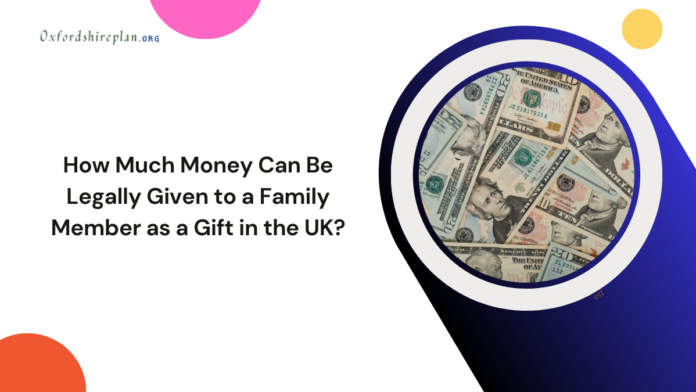Giving financial gifts to family members is a heartfelt way to show support, celebrate milestones, or pass on wealth. However, in the UK, there are specific rules and tax implications surrounding gift-giving. Understanding these guidelines can save you from unexpected tax bills and ensure your generosity benefits your loved ones fully.
This article will explore:
- The annual gift allowance and exemptions
- Tax-free gift options for special occasions
- The impact of inheritance tax on gifts
- Practical tips to maximize tax-free giving
Let’s break it all down.How Much Money Can Be Legally Given to a Family Member as a Gift in the UK
Contents
- Understanding the Legal Framework of Gift-Giving in the UK
- 1. Annual Gift Allowance: The Foundation of Tax-Free Giving
- Key Features:
- 2. Small Gift Exemptions: Ideal for Multiple Recipients
- Conditions:
- 3. Tax-Free Gifts for Special Occasions
- Important Notes:
- 4. Regular Gifts from Surplus Income
- Conditions:
- 5. Inheritance Tax and the 7-Year Rule
- How Taper Relief Works?
- 6. Unlimited Gifts to Spouses and Civil Partners
- Why This Matters:
- Practical Tips for Tax-Efficient Giving
- Summary Table: Key Tax-Free Gift Allowances
- Final Thoughts
Understanding the Legal Framework of Gift-Giving in the UK
In the UK, a gift can be any transfer of money, property, or valuable assets without expecting something in return. Examples of gifts include:
- Money (cash, bank transfers, or cheques)
- Property or land
- Stocks and shares
- Personal belongings like jewelry, cars, or antiques
The rules for tax-free giving depend on the value, the recipient, and the timing of the gift.
1. Annual Gift Allowance: The Foundation of Tax-Free Giving
The UK government allows each individual to give up to £3,000 per tax year without it being subject to inheritance tax (IHT). This is known as the annual exemption.
Key Features:
- You can give £3,000 to one person or split the amount among several people.
- If you don’t use your full allowance in one tax year, you can carry it forward to the next year, but only for one year.
Example:
If you didn’t use your allowance in 2023-24, you can combine it with the current year’s allowance, giving up to £6,000 tax-free in 2024-25.
2. Small Gift Exemptions: Ideal for Multiple Recipients
You can also give small gifts of up to £250 per person per year, and these won’t count towards your £3,000 allowance.
Conditions:
- The recipient cannot be someone who has already received part of your £3,000 annual exemption.
- You can give small gifts to an unlimited number of people.
Example:
You can give £250 each to all your nieces, nephews, and grandchildren without triggering any tax implications.
3. Tax-Free Gifts for Special Occasions
The government recognizes the significance of milestones like weddings and civil partnerships. Gifts for these occasions are exempt from inheritance tax, provided they meet specific limits.
| Relationship to Recipient | Maximum Tax-Free Gift |
|---|---|
| Child | £5,000 |
| Grandchild or Great-Grandchild | £2,500 |
| Other Relative or Friend | £1,000 |
Important Notes:
- The gift must be made before the event.
- The exemption no longer applies if the wedding or civil partnership doesn’t take place.
4. Regular Gifts from Surplus Income
Another overlooked way to give tax-free is by making regular gifts out of your income, such as monthly transfers or annual contributions.
Conditions:
- The gifts must come from your regular income (e.g., salary, pension, or rental income).
- The giver must retain enough income to maintain their standard of living.
- Proper records must be kept to prove that the gifts qualify.
Example:
If you have a pension income of £40,000 per year and only need £30,000 for your living expenses, you could gift the remaining £10,000 tax-free.
5. Inheritance Tax and the 7-Year Rule
Larger gifts outside the allowances may be subject to inheritance tax if the giver passes away within seven years.
| Years Between Gift and Death | Tax Rate Applied |
|---|---|
| 0-3 years | 40% |
| 3-4 years | 32% |
| 4-5 years | 24% |
| 5-6 years | 16% |
| 6-7 years | 8% |
| 7+ years | 0% |
How Taper Relief Works?
Taper relief reduces the amount of tax payable on gifts, but only for those valued above the £325,000 inheritance tax threshold.
Example:
If you gift £100,000 and pass away five years later, the inheritance tax rate reduces to 16%, but only on the portion exceeding the threshold.
6. Unlimited Gifts to Spouses and Civil Partners
One of the most flexible exemptions allows you to gift any amount to your spouse or civil partner without incurring taxes, provided both of you are UK residents.
Why This Matters:
This rule makes it easy to transfer wealth within families without worrying about inheritance tax implications.
Practical Tips for Tax-Efficient Giving
- Maximize Your Allowances: Use the annual £3,000 exemption and small gift allowance every year.
- Plan Special Occasion Gifts: Take advantage of the higher limits for weddings and civil partnerships.
- Keep Detailed Records: Note dates, amounts, and recipients to provide proof if required by HMRC.
- Avoid Overlapping Exemptions: Ensure small gifts don’t overlap with your annual allowance.
- Seek Expert Advice: To structure your giving effectively, consult a financial advisor for large gifts or complex situations.
Summary Table: Key Tax-Free Gift Allowances
| Gift Type | Tax-Free Amount | Conditions |
|---|---|---|
| Annual Allowance | £3,000 | Per person per tax year; carry forward unused allowance for 1 year. |
| Small Gifts | £250 per person | Unlimited recipients; not part of the £3,000 allowance. |
| Wedding Gifts | £1,000-£5,000 | Must not affect the standard of living; detailed records required. |
| Gifts to Spouse/Civil Partner | Unlimited | Both must live in the UK. |
| Regular Gifts from Income | Unlimited | Must not affect the standard of living; detailed records are required. |
Final Thoughts
Gift-giving is a beautiful way to support loved ones and share your wealth. By understanding HMRC’s rules, you can make informed decisions, maximize tax-free allowances, and avoid complications. Whether it’s a small gesture or a significant transfer of wealth, proper planning ensures your generosity leaves a lasting impact without any tax surprises.
If you’re planning substantial gifts, consulting a tax expert or financial advisor is always a good idea to navigate complex rules confidently.
Would you like additional details on a specific aspect?
Click here to learn more

I am a dedicated lifestyle and fashion enthusiast, always looking for the latest trends and timeless styles. With a flair for creativity and a passion for self-expression, I provide fresh insights and tips on elevating everyday living and personal style.















